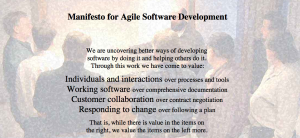Metodologias ágeis são processos, agilidade é cultura
26 de abril, 2009Gestão Ãgil de Produtos
1 de junho, 2009Posted originally in Portuguese at Locaweb’s AgilBlog
I recently read about agile culture and how some teams use only the processes embedded into the agile methodologies without absorbing the agile culture:
Doing some research on Wikipedia, I found:
- Culture is “an integrated pattern of human knowledge, belief, and behavior that depends upon the capacity for symbolic thought and social learning”. It is also “the set of shared attitudes, values, goals, and practices that characterizes an institution, organization or group”.
- Process is a “collection of related, structured activities or tasks that produce a specific service or product (serve a particular goal) for a particular customer or customers. It often can be visualized with a flowchart as a sequence of activities”.
which means that while process is “how things get done”, culture explains “why things should be done that way”.
What matters the most is the culture, since without knowing “why” something should be done in some way it is very difficult to follow and maintain that way – the “how” to do those things.
We can have an agile culture without any methodologies. If we present the Agile Manifesto and its principles to someone who never heard of agile methodologies, is very likely that she end up creating some processes which enable the agile culture.

On the other side, given an agile methodology like Scrum or XP, it is not easy to understand why this process should be followed. We can even see some benefits in the daily routine of software development but without knowing why we should follow this process, the probability that the process continues to be followed or, even more important, that the process evolves, are minimum.

That’s why it is so important to understand the agile culture before implementing any agile methodology
But culture change is a long term task, slow and difficult to measure. And any long term, slow and difficult to measure task is of little attractiveness. People look for the culture change benefits but are not willing to spend what is necessary to get to the results. That’s why we see the recipes.
Implementing methodologies and process changes are short term tasks, with great impact and easy to measure (graphs, points, etc.). That’s why we naturally prefer methodologies, the recipes.
It is very important to coordinate the methodology implementation and the process change in order to be sure they are not performed mechanically and that they are gradually inserted as a new organizational culture.
Coordinating the methodology implementation and the process change is not about knowing a lot about the topic and answering questions like “what should I do with the story points of this unfinished story?” or “should we estimate stories in points or hours?” or “should we use kanbam, lean, XP, scrum, …?” or …
This coordination must be in the direction of “agile thinking”. Agile methodologies are supposed to helps us think agile but many times it makes us stop thinking. :-/
Culture can only be changed through thinking, arguing, listening, experimenting.
Following recipes without thinking, arguing, listening and experimenting is a sure recipe for a mechanical implementation of the methodologies and a good chance of failure.
As mentioned in Outliers and in a very interesting Scientific American article, in order to be a specialist in anything we must practice in a thoughtful way and understanding what we are practicing and never execute the “blind practice”.
So in your next revision and planning meeting, or even during your daily stand up meeting, remember that prior to the methodologies comes the agile culture. Re-read with your team the agile manifesto and its principles and discuss the following topics:
- why these principles are important to us?
- what have we done to follow these principles?
- are there any principles we do not follow? why?
Agile is culture, agile methodologies are the processes that help create this culture.
Would you like to read more about this topic? Please check other posts on agile and agile methodologies.
